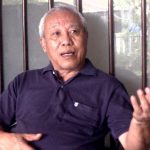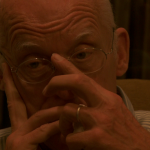[tab] [tab_item title=”ID”]
Benjamin Cook adalah salah satu tamu yang hadir dalam Arkipel 2015. Ben, biasa dia disapa, adalah pendiri dan direktur dari LUX, sebuah agensi seni internasional asal Inggris yang memusatkan pada promosi karya gambar gerak khususnya filem experimental, seni video, seni instalasi, seni pertunjukan, dokumenter pribadi , filem esai dan animasi. Ben sendiri sudah lama bergerak dalam jalur seni di Inggris sebagai kurator, produser, penulis, dan dosen. Ben meraih gelar MA untuk pengarsipan film (Film Archiving) dari University of East Anglia dan Post-Graduate Diploma di Broadcast Journalism dari Sheffield Hallam University.
Pada tanggal 26 Agustus 2015 pukul 13.00 WIB Jurnal Footage mendapat kesempatan melakukan wawancara singkat disela kesibukannya menjadi pembicara dan kurator di Arkipel 2015. Wawancara dilakukan di lobi Hotel Whiz, CIkini. Hadir saat itu Afrian Purnama (redaktur) dan Muhammad Fauzi (kamera).
Rian: Terimakasih atas kehadirannya di Arkipel 2015, karena kamu sudah di jalur ini sejak lama, aku ingin bertanya apakah kemungkinan-kemungkinan yang bisa terjadi di masa depan di scene ini?
Ben: Saya orang yang sangat optimistis, jadi saya pikir segalanya akan lebih baik, menurutku beberapa hal yang terjadi di masa lampau sudah tidak terjadi lagi, orang-orang dulu bergerak dan membentuk jalur Bawah Tanah (underground), seperti tempat tertutup yang berbicara untuk dirinya sendiri, menjadi berada di atas Permukaan (overground). Sekarang ada kemungkinan dimana orang-orang bisa berbicara dengan lantang di depan masyarakat, aku sangat berharap terhadap hal ini di masa depan.
Rian: Di Indonesia kita membentuk semacam komunitas, apa hal yang serupa juga terjadi di Inggris ?
Ben: Iya, kita datang dari tradisi yang sama, kita juga memulai sebagai komunitas tetapi sebenarnya… energinya, aku percaya bahwa energi ini, segalanya harus berawal dari bawah, aku rasa segalanya akan tetap seperti itu. Aku yakin akan ada semaca evolusi, seperti… ini akan berubah menjadi hal lain. Saat diskusi kemarin kita juga berbicara tentang adanya kesulitan. Terkadang ada kesulitan saat membuat perubahan dari berbicara di komunitas ke publik, aku sudah mengalaminya, bagaimana caranya berbicara, bagaimana caranya terlibat dengan orang lain, juga caranya menggunakan bahasa yang lain. Ini juga pertanyaan yang ditanyakan (saat diskusi) kemarin, di komunitas, kita sudah saling mengenal, tetapi masyarakat luas tidak demikian, kita harus menyadari bahwa dunia bergerak dengan sangat cepat tiap hari, salah satu kelebihan yang kita miliki adalah kita harus terus melakukan riset, menginvestigasi, berusaha mengerti bahwa ada sesuatu, kita melakukan riset pada masyarakat, dan memikirkan implikasinya, juga dengan akses mudah dari media dan teknologi menurutku hal itu juga akan membuat perubahan, orang-orang mulai mengenali nilai dari komunitas, tentu itu bukanlah hal yang buruk, tetapi energi yang pokok inilah yang berubah! Yang menarik adalah bagiku di Indonesia, Eropa Barat sekarang segalanya sudah kuno, orang-orang sudah tua struktur yang sudah kokoh dan berdiri sejak lama, jadi sulit sekali membayangkan hal yang berbeda. Sekarang energi pokok tersebut sudah bergerak ketempat seperti Indonesia, masyarakatnya masih belia, banyak anak muda, mereka memiliki energi ini dan disini strukturnya belum tetap. Dalam beberapa hal itu juga adalah kesulitan tetapi ada kemungkinan lain untuk membentuk masyarakat dan hal lainnya, aku percaya ada banyak potensi di masa depan di tempat seperti Indonesia.

Rian: Teknologi baru seperti Internet akan membuat orang lebih mudah mengakses dan menggunakan arsip publik dibanding dimasa lalu, apa dampaknya bagi scene ini ?
Ben: Benar, ada banyak sekali informasi untuk diakses saat ini, tetapi tetap juga ada masalah seperti sistem birokrasi nasional, masalah yang umum di tiap negara, tapi ada masalah lain. Ini sepertinya masalah eksistensial kontemporer, yaitu navigasi, kita memiliki terlalu banyak informasi, sangat banyak dan informasi tersebut menjadi hilang lagi, seperti hutan dengan banyak pepohonan, jika hanya ada satu pohon, pohon itulah yang kita lihat, tetapi bila hutan, sulit bagi kita untuk mencari pohon yang dicari. Jadi menurutku kita harus memusatkan pada hal-hal yang lingkupnya lebih sempit ketimbang melompat ke internet kemudian menjadi gila! Kebisingan informasi inilah masalah saat ini, agak aneh karena saat kita memiliki terlalu banyak akses, justru ada banyak kebisingan, atau mungkin tidak begitu banyak akses, jadi tidak terlalu bising, jadi kita perlu menurunkan volume, dan melepaskan informasi yang kita tidak perlu,
Rian: Menurutmu, apakah video saat ini bergerak melawan media arus-utama ?
Ben: Sulit mengatakan demikian karena ini sangatlah terpecah, menurutku segalanya tergantung dari situasi setempat, tergantung dari jenis videonya, mediumnya, ini seperti menanyakan, apakah masih ada potensi radikal (dalam medium ini) dan ya masih ada, keduanya adalah dalam hal menyebarkan informasi karena film adalah ini adalah medium yang sangat gampang diakses. Sekarang film dan video menjadi sangat penting bagi orang-orang untuk mendapatkan informasi, bisa dilihat begitu mudahnya, bahkan bila tidak bisa membaca, dengan menonton kamu bisa mengerti, dan orang-orang yang mengerti medium akan mengerti hal ini. Itu satu hal, lainnya adalah ada kebutuhan untuk kebertahanan melawan, atau mempertanyakan media arus-utama karena mereka masih sangat mengarahkan. Menurutku salah satu yang membahayakan saat ini kita diberi tahu bahwa di ‘masyarakat bebas’ ini informasi dan ekspresi saling terbuka dan bebas, tapi ini adalah kekeliruan. Menurutku seperti internet ini tidak lah benar-benar bebas, ada tingkatannya, itu adalah sistem kapitalis, didominasi oleh korporat, informasi dibeli dan dijual, walaupun segalanya sepertinya bebas seperti utopia, sebenarnya ada yang bersembunyi, mengontrol, dan kita perlu membicarakan hal ini.

Rian: Tapi korporasi memang terjadi dimanapun..
Ben: Ya, tapi sesuatu tentang internet ini, menurutku sangatlah berbahaya, menjual ide utopis, sebuah padang besar, semua orang diizinkan berekspresi, mendapatkan informasi, tidak ada yang mengendaliakan, tapi faktanya tidak, ada yang mengontrol. Ini seperti pokok terakhir tentang ‘hutan’ itu, siapapun yang mengontrol informasi maka dialah yang mengontrol ‘hutan’. Inilah pokok pentingnya, semua ini hanyalah urusan bisnis semata, seperti media sosial, mencoba menjual ide komunikasi, informasi, namun nyatanya yang mereka jual Ilusi Besar.
Rian: Apa opinimu tentang Arkipel ?
Ben: Menurutku ini sangatlah baik, aku senang bisa datang kesini, banyak bahasa yang digunakan untuk menjelaskan banyak hal, seperti karya-karya Forum Lenteng, bahkan dengan kultur dan negara yang berbeda kita bisa mengenalinya, jadi segalanya sangatlah menyenangkan bagiku dan menarik. Konstruksi festival yang sangat menarik dalam hal melibatkan banyak pihak, membentuk ide-ide, kreativitas yang terhubung antara orang-orang diskusi dan pertemuannya, segalanya membentuk kesatuan, dan ini penting bagi sebuah festival.
[/tab_item] [tab_item title=”EN”]
One of the guest that came in Arkipel 2015 Grand Illusion is Benjamin Cook. Ben, his nick name, is the founder and director of LUX, an art agency from England focused for the support and promotion of artists’ moving image practice and the ideas that surround it. The particular focus of LUX is visual arts-based moving image work, a definition which includes experimental film, video art, installation art, performance art, personal documentary, essay films and animation . Ben has been involved in British art scene for a long time as curator, producer, writer and lecturer. Ben graduated from University of East Anglia for Film Archiving and Post Graduate Diploma for Broadcast Journalism at Sheffield Hallam University.
In 26 August 2015 at 13.00 WIB Jurnal Footage have a chance for a brief talk between his busy schedule to be curator and speaker for Arkipel 2015. the interview located in Whiz Hotel lobby, Cikini. Afrian Purnama (Contributing editor) and Muhammad Fauzi(camera) are present at that time.
Rian: Ben, Thank you for coming to Arkipel 2015. Since you have been in the scene for a long time, i want to ask what is the potential in the future for the scene?
Ben: I am very optimistic person, so I think things will gonna be better. I think some interesting thing that happen in my time, is kinda history in this area, people moved and formed in underground, just like a closed scene that just speak to itself to kinda much more overground. there’s a possibility where we able speaking loudly in front of wider society. I feel very hopeful for that in the future.
Rian: In indonesia we formed a kinda community based. Is that similar thing happen in England?
Ben: Well yeah, we come from the same tradition. Were started as a community, but in a way… the energy I always believe the energy, everything have come from the bottom. I bet thats gonna stay, thats is true. But i think there’s gonna be evolution. In some ways.. it will changes in different way, so i think, one of the thing that we were talking yesterday (the program discussion) was sometimes, the pain, sometimes painful changes to moving from a community to public. I already make that change, how you open up..how you involved with more people, how you change your language as well, because think one of the problem, thats another thing people were asking question about yesterday, we (in the community) kinda understand eachother, we use the same language, we reconize eachother. But in the wider society that’s probably not so good. We have to realize that the world is changing fast everyday. One of the value that we have in this area is that we have to research, investigate trying to understand all things, we doing research for society, and thinking about the implication, and also, with some easy access to media and technology I think those gonna make changes as well. People start to recognize the value of community. Of course that’s maybe not bad, but the critical energy, well thats changed! What interesting to me is in Indonesia. Now in Western Europe its an old society. The people are old, the structure are heavy, and been there for a long time, system are very fixed, so it’s hard to imagine things differently. Now the critical energy has moved to a place like Indonesia. It’s a young society, many young people, they have the energy and there dont have fixed structure now. In some way thats also difficult as well, but there other possibility as well to shaped the society and all of these things. I believe there is much more potential. So I think the future is in the place like indonesia.

Rian: With new technology like internet it’s become easier for people to access and use public archive compared to the past. What is the effect of in this area ?
Ben: Yeah i think there are much information to access right now, but there are still many problem to face like national birocratic system, problem on most of national archive in every country. But there is another problem, it’s like existential contemporary problem, its about navigation. We have too much information, so much information and the information become invisible again. It’s like a forrest with so many trees. If there is one tree you see one tree, but if it forrest, its harder to find the tree. So I think we have to focus on local thing instead jump to the internet and lose your mind! The noise of information is the problem now. It’s kinda weird because we have too much access otherwise too much noise, or maybe not too much access not too much noise, so we have to turn the volume down, and release the information we dont need.
Rian: Do you think that videos are moving against mainstream media ?
Ben: It’s hard to say because its so fragmented, but i guess that really depend on the local situation as well. Depend on what kinda video, what kinda medium. It’s more kinda question about is there still radical potential (in the medium), and yeah there is, both in terms of disseminating information because its a really accessible form. Now film and video is really important way for people to getting information. It’s really easy you can see, even if you cant read, and watch films you will understand, and people with (medium) literacy, will understand this. That’s one thing. There is a need for resistance againts, or questioning the mainstream media because mainstream media is still very prescriptive. I think one of the dangerous now is we are told of that ‘open society’ like information is open, expression is open, but thats a fallacy I think things like internet is not free it’s hierachy, its a capitalistic system, dominated by companies, information brought and sold. Even though things look free, like utopia, in a way there is hiding, deeper about control, and we need to speak out.

Rian: But corporation happen everywhere..
Ben: Yeah but things in internet, I think its very dengerous. It sold the utopian idea. It’s an open field, anybody can express, anybody can get information, nobody control.. but the fact is no, people did control. This is like the last point of the ‘forrest’, the one who control the informations, control the ‘forrest’. This is important point now. It’s all just business,like social media, trying to selling this idea of communication, information. What they sell is actually Grand Illusion.
Rian: What do you think about Arkipel ?
Ben: I think it’s really well. I am glad to coming here. A lot of language you use to describe things, like the work of Forum Lenteng, even in different culture and country we can reconize it so things are very comfortable for me and its very interesting. There is interesting structure of festival in terms of bring it on together, platforming ideas around, creativity connection between people, the discussion and meeting.. things are coming together and thats important for the festival.
[/tab_item] [/tab]





